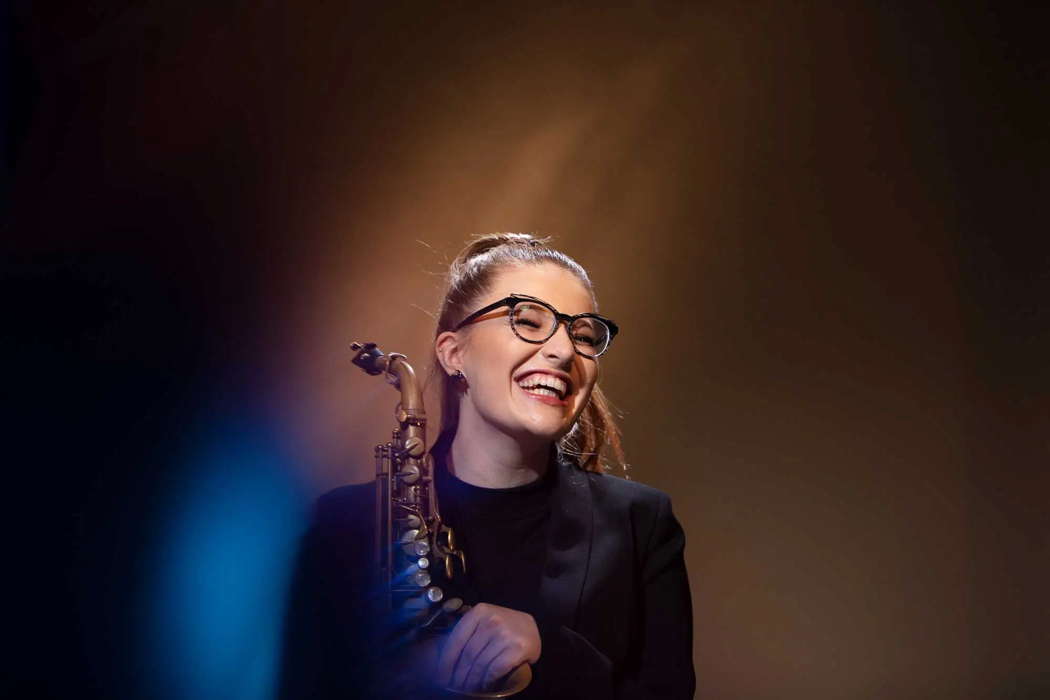- Thomas Adès
- Tera de Marez Oyens
- Edinburgh International Festival
- Witold Rowicki
- Peter Avis
- Shakespeare: The Merchant of Venice
- Lancastria
- Peter Brathwaite
 CENTRAL ENGLAND: Mike Wheeler's concert reviews from Nottingham and Derbyshire feature high profile artists on the UK circuit - often quite early on their tours.
CENTRAL ENGLAND: Mike Wheeler's concert reviews from Nottingham and Derbyshire feature high profile artists on the UK circuit - often quite early on their tours.
 DISCUSSION: John Dante Prevedini leads a discussion about Composers, individuals or collective?, including contributions from David Arditti, Halida Dinova, Robert McCarney and Jane Stanley.
DISCUSSION: John Dante Prevedini leads a discussion about Composers, individuals or collective?, including contributions from David Arditti, Halida Dinova, Robert McCarney and Jane Stanley.
Bright Spots
MIKE WHEELER listens to Jess Gillam and the Hallé Orchestra conducted by Stephen Bell
Billy the Kid, the first of Copland's three best-known ballet scores, more or less set the tone for the other two, Rodeo and Appalachian Spring, as well as colouring our perception of his music as a whole, with its evocation of wide open spaces and use of cowboy songs. The Hallé Orchestra and conductor Stephen Bell opened the last concert in the 2021-2 orchestral season at the Royal Concert Hall – Nottingham, UK, 10 June 2022 – with the familiar eight-movement suite. The Introduction was atmospheric, with a sense of weariness in the trudging bass line. The piccolo tune at the beginning of Street in a Frontier Town was under-characterised to start with, but the Mexican Dance was tightly rhythmic, and the shock of Billy's mother's shooting was allowed time to fully register. Percussion timbres in Gun Battle needed sharper edges, and the celebration after Billy's capture, like the second episode, took a moment or two to really catch fire. The finale, re-focusing on the open prairie, was given an appropriately epic quality. But for Stephen Bell to describe the action after we had heard the music was odd, to say the least.
Saxophone superstar Jess Gillam joined the orchestra for two small-scale concerto-like pieces. John Harle's Briggflatts was written for her, and was prompted by the autobiographical poem of the same name by Basil Bunting, named after the Quaker meeting-house – in Gillam's home county, Cumbria – he attended. Gillam tore into her exuberant opening flourish, eased gently into the more relaxed, song-like music that followed, and deftly navigated the intricate figuration of her later solos. The orchestra's rhythmic handclaps were right on the nail, too. In the second movement, the vibraphone and glockenspiel colouring added a bright, ringing quality to the music's lyrical flow. The finale opens with the saxophone calmly riding some evocative Percy Grainger-ish harmonies, before breaking into a fast reel. More traditional dance tunes follow, which Gillam and the orchestra dispatched with breathless energy, resulting in a vigorous Cumbrian hoe-down.

Jess Gillam
After the interval, Gillam was back, with a soprano sax this time, for John Williams' Escapades, for which he drew on his score for Stephen Spielberg's film Catch Me If You Can. Vibraphone - the player not separately named in the programme's orchestra list - and double bass principal Billy Cole joined her at the front of the stage. The first movement has what I can only describe as a slithering quality, which was nicely caught, as was the underlying vein of sadness in the second movement. In her account of the cadenza, Gillam fined her tone down to a tiny thread of sound. The finale had an infectious, balletic quality. Afterwards, in a touching gesture, Gillam presented her bouquet to the vibraphone player.
The Prologue to the Symphonic Dances from Bernstein's West Side Story didn't quite convey the required sense of menace, but 'Somewhere' featured expressive solos from leader Paul Barritt, Timothy Pooley, viola, Laurence Rodgers, horn, and Stéphane Rancourt, oboe, and the Scherzo had the required rhythmic precision. In the Mambo, brass and percussion were allowed to over-dominate, and while the Cha-cha had a light touch, Cool Fugue emerged as efficient but rather soulless. The finale, though, did convey an apt sense of shock after the gang violence has done its worst.
John Adams' Short Ride in a Fast machine should have been an ideal pay-off, but it felt a bit heavy-handed.
The evening had its bright spots, and Jess Gillam's contribution was outstanding, as we knew it would be, but as a whole I didn't come away on as much of a high as I was expecting.
Copyright © 20 June 2022
Mike Wheeler,
Derby UK

MORE ARTICLES ABOUT THE HALLÉ ORCHESTRA
MORE ARTICLES ABOUT NOTTINGHAM ROYAL CONCERT HALL


